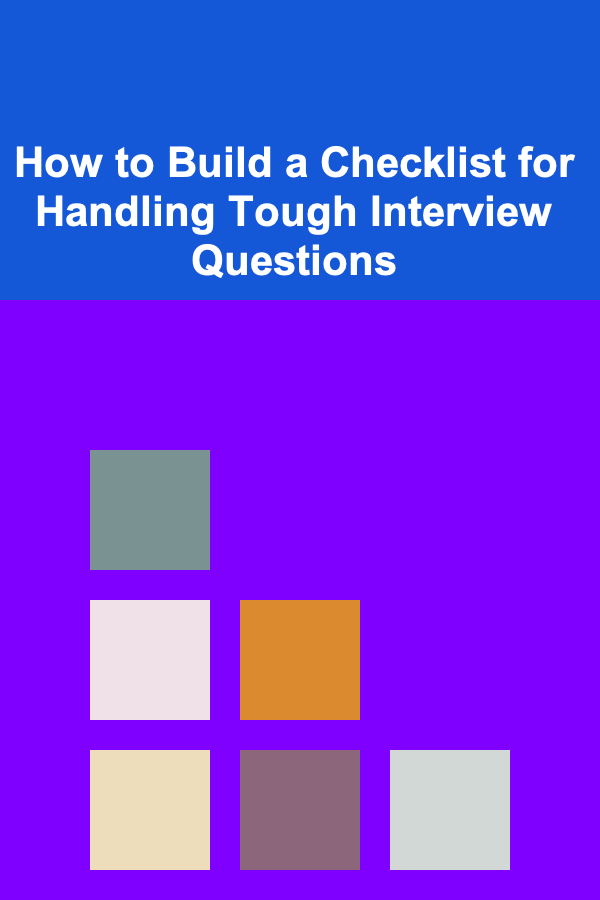
How to Build a Checklist for Handling Tough Interview Questions
ebook include PDF & Audio bundle (Micro Guide)
$12.99$8.99
Limited Time Offer! Order within the next:

Interviewing for a job can be a nerve-wracking experience, especially when faced with tough questions that seem designed to put you on the spot. However, with the right approach and preparation, you can confidently navigate even the most challenging queries. Building a checklist for handling tough interview questions can help you stay composed, organized, and ready to provide thoughtful responses.
This actionable guide will walk you through how to create a checklist that can serve as a strategic tool when preparing for and responding to difficult interview questions. By following these steps, you'll develop a well-rounded approach to tackling tough questions, improving your chances of success.
Understand the Types of Tough Interview Questions
Before diving into your checklist, it's essential to understand the types of difficult questions you may encounter. Tough questions can fall into several categories, each requiring a different response strategy.
Categories of Tough Interview Questions:
-
Behavioral Questions: These questions ask about your past experiences to predict how you will behave in similar situations in the future. Examples include:
- "Tell me about a time you faced a challenge at work and how you handled it."
- "Describe a situation where you had to work with a difficult colleague."
-
Situational Questions: These focus on hypothetical scenarios and test your problem-solving skills. For example:
- "How would you handle a project with a tight deadline and limited resources?"
- "What would you do if you disagreed with a decision made by your manager?"
-
Self-Assessment Questions: These questions require you to reflect on your strengths, weaknesses, and personal qualities. Some examples are:
- "What is your greatest weakness?"
- "Where do you see yourself in five years?"
-
Skill and Knowledge-Based Questions: These assess your technical expertise or job-specific skills. For instance:
- "How would you solve this coding problem?"
- "What are the latest trends in marketing analytics?"
-
Stress Test Questions: Interviewers may deliberately ask tough or uncomfortable questions to test your composure. These could be questions like:
- "Why should we hire you over other candidates?"
- "Why did you leave your last job?"
Develop Your Checklist for Preparation
Now that you know the types of questions to expect, you can create a checklist that focuses on preparation and building confidence. Here's how you can approach each category systematically.
Actionable Checklist for Preparation:
-
Research the Role and Company:
- Understand the job requirements and company culture to anticipate role-specific questions.
- Research common challenges faced by people in similar positions and how to frame your experiences to align with these challenges.
- Learn about the company's mission, values, and key initiatives. This will help you answer why you want to work there and show that you're a good cultural fit.
-
Prepare STAR Responses for Behavioral and Situational Questions:
- Situation: Describe the context or challenge you faced.
- Task: Outline your role and responsibilities in the situation.
- Action: Explain the steps you took to resolve the issue.
- Result: Share the outcome of your actions and what you learned from the experience.
Practice applying this framework to different examples in your professional life.
-
Reflect on Your Strengths and Weaknesses:
- Strengths: Choose 2-3 strengths relevant to the job and provide specific examples of how you've demonstrated these strengths.
- Weaknesses: Select a genuine weakness but also explain the steps you are taking to improve. Frame it in a way that shows self-awareness and growth.
-
Plan Your Responses for Stress Questions:
- Rehearse calm, confident responses for questions like "Why did you leave your last job?" or "Why should we hire you over other candidates?"
- Focus on your positive attributes, your desire to contribute to the company's goals, and your enthusiasm for the role.
-
Prepare for Skill/Knowledge-Based Questions:
- Refresh your knowledge on key industry trends and skills relevant to the role.
- If applicable, practice technical exercises or case studies that are likely to come up during the interview.
- Be ready to explain complex concepts in a clear and concise manner, focusing on how your expertise will benefit the team or company.
Actionable Tip:
- Mock Interviews: Schedule mock interviews with a friend or mentor to practice answering tough questions. This helps build confidence, identify areas for improvement, and refine your delivery.
Handling the Question in the Moment
Once you're in the interview, your preparation will help you stay composed. However, it's important to know how to handle difficult questions on the spot. This involves staying calm, thinking critically, and answering thoughtfully.
Actionable Checklist for Answering Tough Questions:
-
Stay Calm and Take a Pause:
- If a question catches you off guard, take a deep breath and pause for a few seconds to gather your thoughts. It's better to take a moment than to rush into a response that you might regret.
-
Listen Carefully:
- Pay close attention to the wording of the question. If you don't understand something, ask the interviewer to clarify. This will prevent you from answering incorrectly and will show that you're thoughtful.
-
Answer Clearly and Concisely:
- Avoid rambling. Aim for clear, concise responses that directly address the question. Stick to the main points, and use specific examples wherever possible.
-
Be Honest:
- If you don't know the answer to a question or lack a specific skill, be honest but emphasize your willingness and ability to learn. For example, "I don't have experience with that particular software, but I've successfully learned similar tools in the past, and I'm confident I can quickly adapt to this one."
-
Deflect Negative Questions Gracefully:
- For challenging or negative questions, focus on how you overcame challenges rather than dwelling on the issue itself. If asked about a past failure, describe the lessons learned and how they have shaped your professional growth.
-
Use Positive Framing:
- Even when talking about difficult situations or weaknesses, always frame your answers in a positive light. Emphasize solutions, personal development, and what you bring to the table.
Actionable Tip:
- Don't Be Afraid to Ask for Time: If you're unsure about a question, it's okay to say, "That's a great question. Let me take a moment to think about it."
Post-Interview Reflection
Once the interview is over, it's important to take a step back and evaluate how you handled the tough questions. This helps you grow and improve for future interviews.
Post-Interview Checklist:
-
Review Your Performance:
- Reflect on how you responded to difficult questions. Did you stay calm and composed? Were your answers concise and clear? Did you provide relevant examples?
-
Identify Areas for Improvement:
- If there were questions that threw you off or areas where you felt unprepared, take note of them. This will help you focus on improving those areas for future interviews.
-
Follow Up:
- Send a thank-you email to the interviewer, expressing gratitude for the opportunity and reiterating your interest in the role. You can also briefly address any tough questions where you feel you could have provided a better answer.
Actionable Tip:
- Keep a Journal: Maintain a journal of your interview experiences. Write down the tough questions you faced and your responses. Over time, you'll be able to track your growth and refine your approach.
Adapting Your Strategy for Different Interview Types
Different types of interviews (e.g., phone interviews, video interviews, in-person interviews, panel interviews) may require slight adjustments to your approach when answering tough questions. Here's how to tailor your strategy:
- Phone Interviews: Focus on your tone of voice and clarity. Since body language isn't visible, it's important to communicate your enthusiasm and confidence through your voice.
- Video Interviews: Maintain eye contact with the camera, keep a professional background, and avoid distractions. Ensure your technology is working smoothly beforehand.
- Panel Interviews: In panel interviews, address each person when answering questions. Stay engaged with all panelists and be sure to make eye contact with everyone, not just the person asking the question.
Actionable Tip:
- Adapt to the Interview Format: Before the interview, consider the format and make any necessary adjustments to your responses, body language, and environment.
Conclusion
Building a checklist for handling tough interview questions requires careful preparation, self-reflection, and strategy. By researching the role, practicing with real-life examples, and understanding the different types of tough questions, you'll be better equipped to tackle difficult queries confidently.
Remember, the key is not just to answer the question but to demonstrate your problem-solving skills, self-awareness, and ability to adapt to challenges. By preparing thoughtfully, staying calm under pressure, and reflecting on your performance afterward, you can continue to improve your interview skills and increase your chances of success in future job interviews.

How to Develop a Long-Term Investment Mindset
Read More
How to Optimize Closet Space with Space-Saving Hangers and Organizers
Read More
How to Plan a Last-Minute Home Party Without the Panic
Read More
How to Understand and Manage Your Credit Card Debt
Read More
How to Understand Brain-Computer Interfaces (BCIs)
Read More
Top DIY Pet Grooming Tips to Save Money and Keep Your Pet Healthy
Read MoreOther Products

How to Develop a Long-Term Investment Mindset
Read More
How to Optimize Closet Space with Space-Saving Hangers and Organizers
Read More
How to Plan a Last-Minute Home Party Without the Panic
Read More
How to Understand and Manage Your Credit Card Debt
Read More
How to Understand Brain-Computer Interfaces (BCIs)
Read More